Cannibals, Coffins, and Courage
Josiah Harling
Growing up, I always associated missions with my great grandfather. I didn’t know much about him, but I knew he and his wife moved to Nigeria in the early 1900’s, and he wore a tie while wandering through the African bush. I simply couldn’t understand (still can’t) why anyone would wear a tie in 100 degree weather.

It wasn’t until just a few years ago that I really heard the details about their story.
Serving Cannibals
My great grandparents were followers of Jesus and felt He was calling them to go as missionary workers to Nigeria. The tribe they were burdened for were actually cannibals. They were advised that if they went, they should pack their belongings in a coffin.
Not to be talked out of it, they partnered with an excellent organization that could help them with logistics and care, and they went. Not for a week, not for a month… they went for a lifetime.
Upon arrival, they learned a bit of the language and quickly set up a home in the African bush. Adjusting to life in Africa was hard; scorching heat, drought, snakes (hiding in the thatch roof of their home!), let alone the hostility towards them from the very people they were hoping to serve!
Great grandpa was a handy man (sadly this trait wasn’t passed down to me!), and he was tired of the snakes – so he actually built the first tin roof in that part of West Africa. Game changed!
If only life change was that easy! Spiritually, the tribe in Nigeria was very opposed to the good news of Jesus. In fact, they had their own gods, including a god named “Togma”. Togma was the god who controlled the weather, the heat, and the rain… or the lack thereof.
Desperation and Revival
One day as my great grandfather was out hunting, great grandma heard a knock on her door. She came to the door and saw that her house was surrounded with about a hundred African warriors, ready to fight. She was informed that the reflection of the sun off their metal roof had deeply offended Togma, and that’s why they were in a devastating drought.
They told her that she would be killed as a sacrifice to togma to appease him.
She begged and pleaded for them to wait until her husband got home, which they agreed to do.
She went back inside her home and started praying. She prayed, and prayed, and prayed – “God, let it rain. You’ve got to let it rain. We have no hope but for you to make it rain!”
Have you ever prayed with that kid of desperation?
“God doesn’t call us to be comfortable. He calls us to trust Him so completely that we are unafraid to put ourselves in situations where we will be in trouble if He doesn’t come through.”
– Francis Chan
Later that afternoon, great grandma noticed a cloud on the horizon. Not long after, she saw another, then another. Next thing you know, there was a torrential downpour.
The downpour sparked a revival. Great grandpa and great grandma witnessed a massive movement of God. Hundreds of people decided to follow in the ways of Jesus.
Empowerment Over Paternalism
Great grandpa saw a need in the community for education, so along with a team of local leaders they started schools for children. They saw a need for quality medical care, so together they started clinics.
When Jesus-followers enter a new community as humble servants, the physical realities of those in the community should improve, not only the spiritual realities!
A couple years ago, my dad went to visit Nigeria. He found himself in the office of the president of ECWA (“Evangelical Churches of Western Africa”). It’s a church denomination 2 million strong – they now send missionaries to the US!
On the wall of his office was an old picture of a bunch of African children, and my great grandfather. Great grandpa empowered. He helped equip local leaders, and then got out of the way and let them lead.
My great grandparents weren’t on a global conquest for conversions. They didn’t go overseas to spread a cultural christianity or to extend colonialist American thinking on the red continent. Instead, they were servants; students of the needs of the local culture.
Above all, they were willing to be used, counting their own lives as nothing. They were willing to put themselves in a situation where God could show His power.
God wants the willing. At Compel global we guide the willing towards impact.